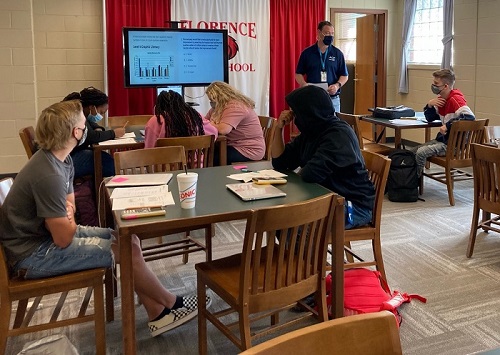
By Brock Turnipseed
Connections Magazine
One of the State Board of Education’s (SBE’s) primary goals is for every student to graduate high school ready for college and careers.
School districts previously measured college- and career-readiness by benchmarks on the English, reading and math components of the ACT. While the ACT measured a student’s college readiness, a tool to measure career readiness was also needed.
To address this need, the SBE authorized The Mississippi Department of Education (MDE) to add the ACT WorkKeys — a national assessment that measures those skills foundational for success in the workplace — to the state’s accountability system for school districts starting with the current academic year.
“Many communities in our state are ACT Work Ready Communities, so many of our businesses, industries and communities recognize WorkKeys as at least a measure — if not the measure — for career readiness,” said Wendy Clemons, the executive director of the MDE Office of Secondary Education and Professional Development.
WorkKeys tests measure three areas — workplace documents, applied math and graphic literacy — to determine the current skills of potential employees and their ability to learn job-specific skills. An ACT WorkKeys National Career Readiness Certificate (NCRC) is issued at four levels: Platinum, Gold, Silver or Bronze.
Many industries require potential employees to have at least a Silver-level WorkKeys designation. For the accountability model, districts earn points for students who earn Gold- or Platinum-levels alone or Silver combined with the completion of an industry certification or pathway.
Dr. Aimee Brown, the MDE’s director of career and technical education (CTE), said the emphasis on WorkKeys is vital for showing that the state’s education system is focused on industry needs.
“Our communities have said this is important because they want to be Work Ready Communities, and that’s attractive to business and industry moving to the state,” she said. “It shows we know Work Ready Communities are important and our business and industry partners value WorkKeys.”
An ACT Work Ready Community commits to link workforce development to education; align with the economic development needs of the community, region and state; and match individuals to jobs based on skill levels.
As of September 2021, 59 of the state’s 82 counties are participating in the Work Ready Communities program, with 49 achieving Work Ready Community certification. Additionally, more than 2,600 state employers support potential employees having an ACT WorkKeys NCRC.
Madison County was certified as an ACT Work Ready Community in 2019. Lauren Scheel, the chief operating officer for the Madison County Economic Development Authority (MCEDA), said WorkKeys is mutually beneficial for both employers and potential employees in the county.
“It gives potential employees a special certification and the confidence to go to an employer and say, ‘I am employable,’” she said. “It also helps our existing industries when they are trying to recruit employees. It offers a level of confidence from both sides.”
Having WorkKeys as part of the accountability model should expose more students to the test, which will benefit industry because, as Scheel said, K-12 students are the future talent pipeline.
“The WorkKeys assessment allows businesses to go ahead and have a grasp on the skills of the future talent pipeline,” she said. “For employers, it gives them a sense of reassurance that who they’re looking to hire has the basic skills needed to be employable.”
MCEDA works with CTE centers throughout Madison County, and Scheel said it encourages students to work toward a WorkKeys certificate to get closer to meaningful employment.
Michael Ellis, Canton Career Center’s CTE director, encourages his students to take the exam so they can be recognized at graduation and be more marketable to industries regardless of whether they decide to pursue postsecondary education.
“We have to educate them on the seriousness of the test. Students don’t really understand how the test can benefit them. We are communicating to them how this test can benefit them in the long run,” he said.
Ellis previously spoke with Canton students who have taken WorkKeys, and he said the response was positive and they “are more prepared in terms of the job market with industry.”
Blaise King, Madison County Schools’ director of CTE and career academies, said WorkKeys provides a tangible result for taking the exam. In Madison County, he said, individuals with a Silver credential or higher on the WorkKeys receive a guaranteed interview with some employers.
“There’s a way for students to see the benefit of taking the WorkKeys exams,” King said. “It is recognized, so when they go into an interview, they’re able to put it on their résumé. It makes them very marketable for future employers.”
Montgomery Hinton, a Rankin County School District college and career prep specialist, said his district administered WorkKeys to all juniors in the 2020-2021 school year. While there are big advantages for school districts on the accountability side, he said a positive push from industry will help students, especially those in CTE, see the benefit of the exam.
“There is absolutely every reason for CTE to do this. For them, WorkKeys might be more important,” he said. “When you see industries demand from schools that they develop a workforce pipeline that is ready, that’s going to help CTE. I think CTE is the biggest winner in this.”
Hinton, who compiled a comprehensive list of WorkKeys resources on his district’s website, said as WorkKeys continues to grow in the state, “you’re going to continue to see positive things happen that are going to have a huge impact.”
As WorkKeys grows, Brown said it is important to ensure students are just as prepared for a career as they are for college.
“We realize there’s a large portion of our students in the state that need something other than college to fall back on,” she said. “When we talk about wanting students to be career ready, we have to give them WorkKeys as well because an ACT score might not necessarily help them go right to work.”
Being part of the accountability model could expose more students to the WorkKeys exam, but Clemons hopes districts and students see the value in earning an ACT WorkKeys NCRC beyond the accountability points.
“We want WorkKeys to be an integral part of a child’s education, and that should be the purpose that it serves,” she said.
Connections is the magazine for K-12 career and technical education (CTE) in Mississippi. The biannual publication features students, educators, schools and organizations from approximately 50 career pathways across 16 career clusters. This Mississippi Department of Education publication is produced by the Research and Curriculum Unit at Mississippi State University. Issues are disseminated in print and electronic forms in May and December each year. To be added to mailing list, please send your email address to helpdesk@rcu.msstate.edu.

Former Canton High School students (left to right) Kanosha Smith, Christopher Mayfield, Labroski Henry and Richard Shelton display their ACT WorkKeys Silver Award certificates during 2018 graduation ceremonies. Madison County developed into an ACT WorkKeys Community since then.

Lauren Scheel

Michael Ellis

Blaise King
